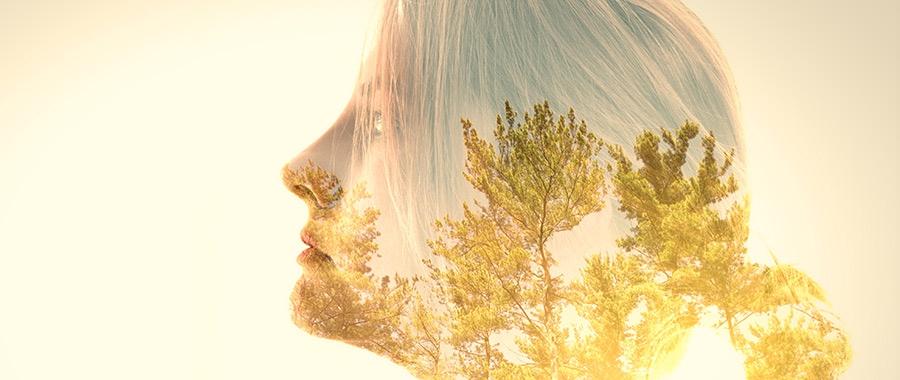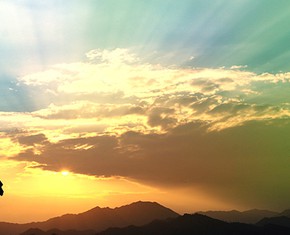The views expressed in our content reflect individual perspectives and do not represent the authoritative views of the Baha'i Faith.
“Could you tell me something,” a friend of mine who is a Methodist minister asked, “about Baha’i prayer?”
What a question! I said “How much time do you have?”
“Oh, just the basics,” he said with a smile.
“How about if I write a short essay?” I asked him. So here it is—my brief, humble and far from complete understanding of what it means to Baha’is to pray.
Baha’is pray to an unknowable God; one that fits no physical description and exists far beyond any of our limited man-made mental conceptions. Baha’is don’t try to anthropomorphize God. The Baha’i writings contain hundreds of beautiful prayers, and Baha’is are free to read, recite, chant or sing them, but can also pray in their own words if they wish. Prayers, for Baha’is, allow each person to converse with God, to unburden their souls, to experience a spiritual epiphany.
The Baha’i teachings urge Baha’is to pray and meditate every day:
… pray to God that daily ye may advance in spirituality, that God’s love may be more and more manifested in you, that the thoughts of your hearts may be purified, and that your faces may be ever turned towards Him. May you one and all approach to the threshold of unity, and enter into the Kingdom. May each of you be like unto a flaming torch, lighted and burning bright with the fire of the Love of God. – Abdu’l-Baha, Paris Talks, p. 75.
For Baha’is, prayer has the power to lead the soul to a different realm of being:
O Son of Worldliness! Pleasant is the realm of being, wert thou to attain thereto; glorious is the domain of eternity, shouldst thou pass beyond the world of mortality; sweet is the holy ecstasy if thou drinkest of the mystic chalice from the hands of the celestial Youth. Shouldst thou attain this station, thou wouldst be freed from destruction and death, from toil and sin. – Baha’u’llah, The Hidden Words, p. 46.
The Baha’i teachings say the Creator has given us a series of intermediaries to help us understand the infinite—prophets and messengers like Christ and Buddha and Moses and now Baha’u’llah, whose purpose involves carrying God’s love and wisdom to humanity. Baha’is are free to pray to those divine messengers, or to God directly, but Baha’u’llah asked us all to pray:
One who performeth neither good deeds nor acts of worship is like unto a tree which beareth no fruit, and an action which leaveth no trace. Whosoever experienceth the holy ecstasy of worship will refuse to barter such an act or any praise of God for all that existeth in the world. – Baha’u’llah, quoted in The Importance of Obligatory Prayer and Fasting, p. 1.
You’ll find that description of prayer and worship—“holy ecstasy”—throughout the Baha’i writings, and in Baha’i prayers like this one:
Make firm our steps, O Lord, in Thy path and strengthen Thou our hearts in Thine obedience. Turn our faces toward the beauty of Thy oneness, and gladden our bosoms with the signs of Thy divine unity. Adorn our bodies with the robe of Thy bounty, and remove from our eyes the veil of sinfulness, and give us the chalice of Thy grace; that the essence of all beings may sing Thy praise before the vision of Thy grandeur. Reveal then Thyself, O Lord, by Thy merciful utterance and the mystery of Thy divine being, that the holy ecstasy of prayer may fill our souls—a prayer that shall rise above words and letters and transcend the murmur of syllables and sounds—that all things may be merged into nothingness before the revelation of Thy splendor. – Abdu’l-Baha, Baha’i Prayers, pp. 69-70.
When I first encountered the remarkable, moving Baha’i prayers, written by Baha’u’llah and Abdu’l-Baha in the pure language of the heart, they sounded somewhat foreign to me, with their elevated tone and sometimes formal idiom. But the more I read them, the more I fell in love—they deeply touched my soul. The beauty of the words and symbols, the power of the gorgeous imagery, the deep mystical allusions carried me away, giving me the profound feeling of entering the majestic presence of something much greater than myself, of having a conversation between my spirit and the Creator.
Perhaps, a friend once suggested, that occurs because many of the Baha’i prayers come directly from the prophet and founder of the Baha’i Faith, Baha’u’llah. In the whole history of world religions, we have very few verified, actual prayers revealed by the prophet and founder of each Faith. But in this new era, the Bab, Baha’u’llah and Abdu’l-Baha revealed literally thousands of incredibly beautiful, powerful and meaningful prayers.
Since my first encounter with those prayers, I’ve come to rely on the power of the Baha’i prayers, and they’ve become the blissful anthems of my spirit:
Wherefore, O beloved of the Lord, strive ye with heart and soul to receive a share of His holy attributes and take your portion of the bounties of His sanctity—that ye may become the tokens of unity, the standards of singleness, and seek out the meaning of oneness; that ye may, in this garden of God, lift up your voices and sing the blissful anthems of the spirit. Become ye as the birds who offer Him their thanks, and in the blossoming bowers of life chant ye such melodies as will dazzle the minds of those who know. Raise ye a banner on the highest peaks of the world, a flag of God’s favour to ripple and wave in the winds of His grace; plant ye a tree in the field of life, amid the roses of this visible world, that will yield a fruitage fresh and sweet. – Abdu’l-Baha, Selections from the Writings of Abdu’l-Baha, p. 11.
















Comments
Sign in or create an account
Continue with Googleor